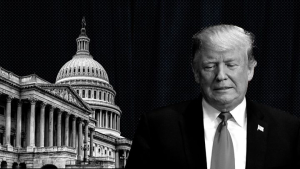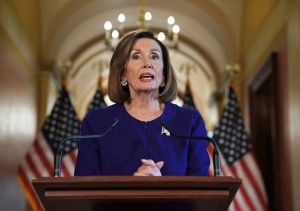Throughout history, there have been 19 impeachment trials, though only two of those have been United States presidents. Though no U.S. president has ever been formally removed from office through impeachment.

Impeachment is charging misconduct to a holder of public office. In September, House Speaker Nancy Pelosi announced a formal impeachment inquiry on President Donald Trump.
Hunter Biden took a paid position on the board of Burisma, a Ukrainian natural gas company in 2014, which came full circle when Trump wanted to use this information for his 2020 election campaign.
April 2019
Yuriy Lutsenko, Ukraine Prosecutor General, alleged that Joe Biden pressured Petro Poroshenko, former Ukrainian president, to fire Ukraine’s prosecutor general in a bid to stop a criminal probe that involved Hunter Biden without any evidence. Lutsenko later told the Washington Post that Hunter Biden did not violate anything.
June 2019
Trump told George Stephanopoulos that he would want to hear if foreign governments offered him damaging intel about his 2020 presidential election opponents.
July 2019
On the 25th, Trump and Volodymyr Zelesky, Ukrainian president, talked on the phone. There was a post on the official website of the President of Ukraine that included that Trump is convinced that the new Ukrainian government will be able to improve the image of Ukraine quickly.
August 2019
CNN later reports that Trump had put a hold in July for military defense funds for Ukraine, roughly a week before his phone call with President Volodymyr Zelensky.
September 2019
The White House released a rough transcript revealing Trump pressuring Zelensky to investigate Joe Biden and his son Hunter.
Days following the phone call, the whistleblower learned that senior White House officials had intervened to “lockdown” all records of the phone call, especially the official word-by-word transcripts of the call.

The committee requested information about Trump’s phone call with President Volodymyr Zelensky. The Washington Post also reported that the whistleblower complaint involves a “promise” made and Trump’s communication with a foreign leader.
Then on the 22nd, Trump recognizes that on the call with Zelensky that he did discuss Joe Biden.
On the 24th, Nancy Pelosi announced a formal impeachment inquiry on Trump, and the next day, the White House released the transcript of Trump’s call to Zelensky.
On the 27th, there were more than 218 House members that supported an impeachment inquiry.
Impeachment Process
“Impeachment starts in the House of Representatives, the sole power to impeach belongs to the House of Representatives. Generally, a resolution is introduced in the House, starting an inquiry. Then that inquiry goes to the House Judiciary Committee, which draws up articles of impeachment,” Dr. James Hedtke, history and political science professor, said. “Then, the article of impeachment is passed on to the full House for a vote. To pass the article of impeachment, they require a simple majority of votes on the floor.”
Once the floor votes, the procedure moves to the Senate, where a “trial” will determine if the president committed a crime. How it is conducted would be determined by the Senate. The Senate then votes on whether the president is guilty or not guilty of the crimes he is accused of committing.
October 2019
On the 22nd, William Taylor, a top US diplomat in Ukraine, testified in impeachment investigation.
Taylor had been told Trump would withhold military aid from Ukraine until it publicly declared investigations would be launched that could help his chances with the 2020 election.

“I think it’s crazy to withhold security assistance for help with a political campaign,” Taylor said to Ambassador Sondland and Volker on Sept. 9th.
Since Taylor’s testimony, Democrats say that William Taylor is now a central part of the impeachment. They say his statement is evidence that Trump was engaged in a quid pro quo. They are also saying that Taylor’s testimony might accelerate the impeachment inquiry.
As of the 30th, the House committee met to consider the resolution, and then members will debate. Afterwards, they will vote on the measure, which CNN says is expected to pass. After, the impeachment inquiry will continue under the impeachment protocols. There will be another week or two of closed depositions, and public hearings could begin as soon as the second week of November.


